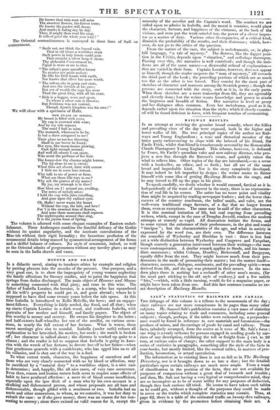HONOUR AND SHAME
Is a didactic novel, aiming to inculcate ethics by example and religion by putting phrases into the mouths of the persons. One purpose, and a very good one, is to show the impropriety of young women neglecting the family affections for literary studies, and to paint the happiness that springs from duties discharged. The main object of Honour and Shame is something connected with filial piety, and runs in this wise. The father of Isabella Loraine, the heroine, is a scamp, who has squandered all his wife's property he could get at, and gone abroad ; where he is supposed to have died some twenty years before the tale opens. At this time Isabella is introduced to Iloilo Melville, the hero ; and an engage- ment follows. Everything is fairly settled, day fixed, and all that; when up starts Captain Loraine in a dark wood, and confronts Isabella, with Portraits of her mother and himself, and family papers. The object of this worthy is money and secrecy. He swears his daughter to the latter; and half-extorts half-wheedles her out of the needful, on various occa- sions, to nearly the full extent of her fortune. What is worse, these secret meetings give rise to scandal. Isabella (under oath) refuses all explanation to her betrothed, his mother, her uncle ; the match is broken off; her character is talked about ; the distress is worked up quite to a Climax; and the reader is led to suppose that Isabella is going to Ame- rica with the wreck of her fortune, to devote herFelf to her father—when that gentleman quarrels with a confederate, who has egged him on to all Ins villanies, and is shot out of the way in a duel. To what extent truth, character, the happiness of ourselves and of those who are very closely connected with us by blood or affection, may be sacrificed by a "natural duty" to a worthless object, is a nice case to determine ; and, happily, like all nice cases, of very rare occurrence. Even then, reason and human nature both seem to require some effects of habit to have produced affection : a mere tie of blood seems insufficient, especially upon the ipse dixit of a man who by his own account is a Skulking and dishonoured person, and whose proposals are all base and dishonourable, though gilded with a sentiment or two. Isabella had an Uncle and other connexions, to whom, as we conceive, it was her duty to submit the case : or if she gave money, there was no reason for her con- senting to secrecy ; since there existed no valid reason for it, except the
necessity of the novelist and the Captain's word. The conduct we are called upon to admire in Isabella, and the moral it contains, would place the character, fortune, and happiness of the virtuous, at the beck of the vicious, and even put the weak-minded into the power of a clever impos- tor as a matter of duty. Various other discrepancies, of a critical kind, diminish the probability of the results, and their distresses ; which, how- ever, do not go to the ethics of the question.
From the nature of the case, the subject is melodramatic, or, in play- bill language, "a tale of mystery." The distress, like the dagger posi- tion in the Critic, depends upon "situation," and sufferings thereupon. Passing over this, the narrative is well contrived ; and though the inci- dents are all of the same nature—a distressful refusal of explanation— they are varied in their form. Captain Loraine, however, does not appear as himself, though the reader suspects the "man of mystery," till towards the third part of the book ; the preceding portions of which are as much too flat as the other is too forced. They consist for the most part of sketches of character and manners among the Scottish gentry ; though the persons are connected with the story, such as it is, in the early parts. When these sketches are a mere transcript from life, they are agreeably and cleverly done ; but the writer wants knowledge and power to attain the largeness and breadth of fiction. Her narrative is level or prosy and her dialogues often common. Even her melodrama, good as it is, depends rather upon the situation than the style; which if closely examin- ed will be found deficient in force, with frequent touches of sermonizing.


























 Previous page
Previous page